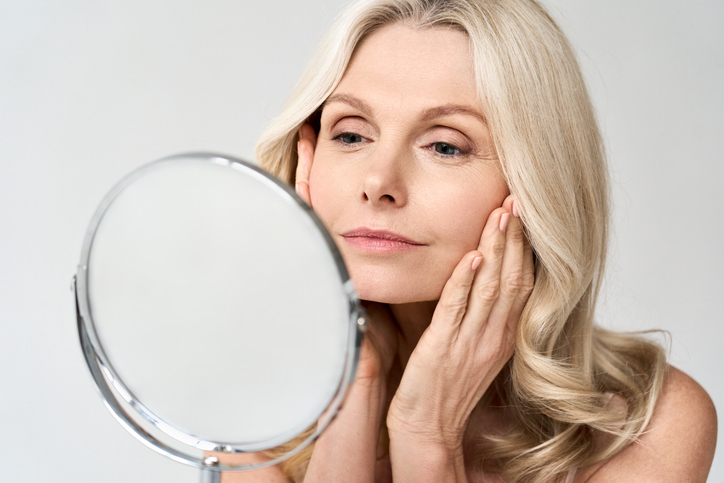Commitment + Clinical Leadership = Better Outcomes

Oily Skin: Causes and Treatments
What causes oily skin?
You might wake up and ask yourself, “Why is my face so oily?” There could be several reasons why you have oily skin, including:
- Genetics. Some people are naturally born with oily skin. If one or both of your parents have oily skin, then there is a chance that you will have it too. Your natural pore size can also contribute to how much oil your skin produces.
- Age. Younger individuals will be more likely to have oily skin than older adults. It’s a fact that people will have dryer skin as they age. Many people over the age of 30 do not have the same skin composition that they did in their 20s.1
- Diet. What you eat may possibly contribute to your oily skin. Foods high in salt and sugar are known to play a role in the amount of sebum your body produces. Fried food, red meat, soft drinks, and refined carbohydrates can also cause oily skin.2
- Hormones. Hormones can be a cause of oily skin, especially during puberty, before menstruation, during menopause, and during pregnancy. Androgens are the hormones responsible for controlling the amount of sebum your body produces, and when the body releases more androgens, your skin will become more oily. Sebum is the substance that prevents your skin from drying out.3
- Makeup: Wearing makeup can clog your pores and cause your skin to become oily. Failure to remove your makeup can also contribute to oily skin.
- Stress. When you become stressed out, your body will produce more of the hormone cortisol. Cortisol increases the body’s oil production, which can cause oily skin and acne.4
- Climate. When it’s hot outside, you will sweat, and the skin will lose its moisture. This causes your body to increase its oil production to maintain its level of oils and hydration. You might have oily skin in the summer time as a result.5
- Medications. Some medications are more likely to contribute to oily skin than others. A few medications associated with oily skin and acne include corticosteroids, lithium, anticonvulsants, barbiturates, androgenic steroids, and DHEA.6
- Over washing. If you over wash your skin, then it will inevitably become oily. Your body will produce more sebum to replace the oils it loses. Wash once in the morning and evening to avoid oily skin.7
Skincare for Oily Skin
You might be wondering how to get rid of oily skin. Here are some dos and don’ts for people with oily skin:
- Wash your face in the morning and evening, and after exercising. Wash your face to cleanse it of the oils and sweat that build up on your face. If you don’t wash your face regularly, you may find yourself with acne and excess oil buildup.
- Avoid oil-based skin products. Skin products that are oil-based can make your skin look greasy and clog your pores. Try to use products that are oil-free and noncomedogenic.
- Use sunscreen. Even if you have oily skin, you should still use sunscreen to protect your skin when you are outside. Sunscreen can protect your skin from sunburns and lower your risk for developing age spots and skin cancer. Check out our blog on how to choose the best sunscreen.
- Moisturize. You might think that it is counterproductive to add moisturizer to your skin if it is oily, but it will actually help your body tame its oil production. When your skin is dry, it tends to produce more oils to accommodate for hydration.
- Avoid touching your face. A study found that people will touch their faces at least 23 times per hour.8 Touching your face can transfer oil and dirt from your fingers to your face, causing your face to become oily. Try to minimize the amount of times that you touch your face during the day by making a conscious effort to avoid it.
- Avoid going to bed with makeup on. If you enjoy wearing makeup during the day, make sure to wash it off before going to bed. Wearing makeup at night can clog your pores and cause your skin to produce excess oils.
- Use blotting paper. You can use blotting paper to absorb excess oil between washes. You can dab your face with the paper, and avoid using it on multiple parts of the face because it can spread oils.
- Drink green tea. Green tea has been proven to help control the amount of sebum the body produces due to the polyphenols, which are plant compounds, in it. One polyphenol in green tea is epigallocatechin gallate, which is known to break the cycle of pores getting clogged.9
It’s important to note that we can’t control the environment we live in or our genetics. If you have oily skin naturally, you may want to visit a dermatologist for advice on how to best care for your skin type.
About Saber Healthcare Group
Saber Healthcare is an organization that provides services to more than 130 buildings across the states of Ohio, Pennsylvania, Virginia, North Carolina, Indiana, and Delaware. To learn more about our company and services, click here.
Saber Healthcare is an organization dedicated to providing consultant services to long-term care providers. This article is for informational purposes and is not meant to be seen as professional advice. Please consult with a medical expert before relying on the information provided.
Sources
- https://www.healthline.com/health/oily-skin-causes
- https://www.byrdie.com/foods-that-cause-oily-skin-5080820
- https://www.foreo.com/mysa/top-7-causes-oily-skin/#:~:text=Hormonal%20Changes,during%20pregnancy%20and%20during%20menopause.
- www.sciencedaily.com/releases/2007/11/071109194053.htm>.
- https://eminenceorganics.com/ca/blog/2021/06/23/best-skin-care-humid-climate#:~:text=Hot%2C%20humid%20weather%20also%20causes,our%20guide%20to%20oily%20skin.
- https://www.webmd.com/skin-problems-and-treatments/acne/features/medications
- https://www.esmiskin.com/blogs/esmi-skin-central/how-often-to-wash-face#:~:text=Even%20if%20you%20have%20super,Dryness
- https://pubmed.ncbi.nlm.nih.gov/25637115/
- https://www.bebeautiful.in/all-things-skin/skin-concerns/green-tea-for-acne#:~:text=Green%20tea%20benefits%20oily%20skin,getting%20rid%20of%20oily%20skin.
